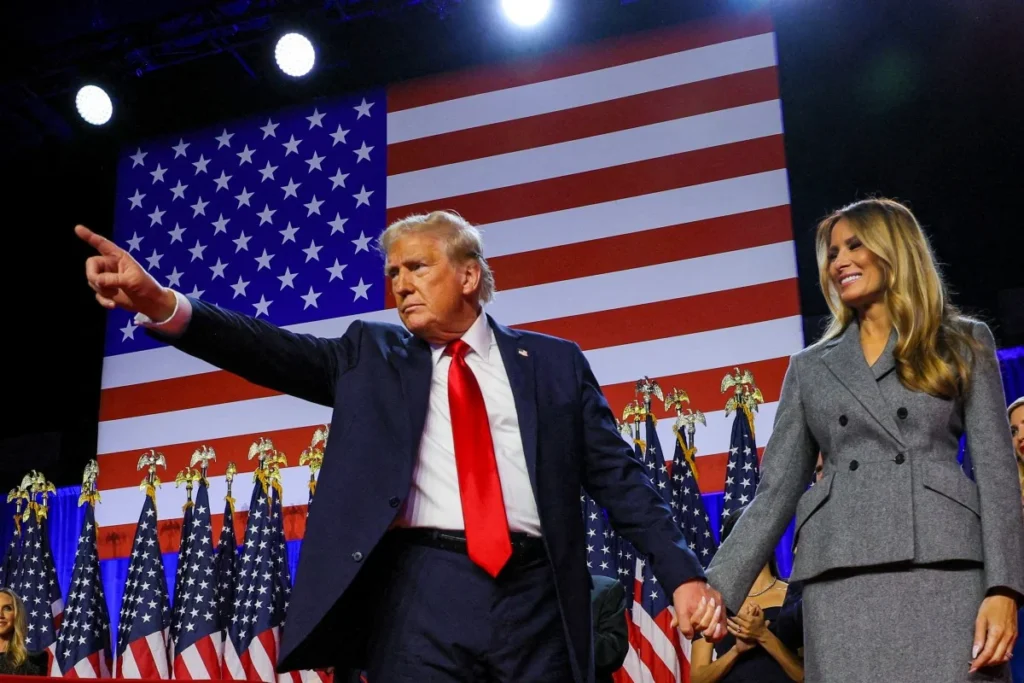AfriqueCAN
Donald Trump’s victory over Democratic candidate Vice President Kamala Harris dominated the news cycle across Africa on Wednesday, with coverage reflecting the anxiety being felt by some on the continent.
In South Africa, the newspaper Business Day ran an opinion column headlined “Trump’s comeback heralds harder U.S. approach to Africa,” while another local newspaper, The Sunday Times, was running a poll for readers asking: “Are you worried about Donald Trump being elected U.S. president?”
A cartoon by renowned South African political cartoonist Zapiro in the Daily Maverick newspaper depicted a frightened looking globe watching TV as U.S. election results came in.
The markets were also affected, with South Africa’s currency, the rand, dropping almost 3% on the news in the early hours of trading.
Trump inspires mixed views on the continent, having riled some by calling African countries a derogatory name in his first term, and being viewed positively by others as a kind of “strongman” leader.
Steven Gruzd, a political analyst with the South African Institute of International Affairs, told VOA that Trump did not pay much attention to Africa in his first term and he doesn’t expect that to change.
“Africa is not going to be a priority for the second Trump administration by any measure, and I don’t think we should expect too much,” he said. “I think we’re also going to see a world that has a very different USA in operation, and African countries will have to decide how they deal with that.”
Asanda Ngoasheng, an independent analyst in Cape Town, said she believes a Trump presidency will affect Africa in terms of trade, with South Africa possibly seeing its exports to the U.S. reduced.
Ngoasheng said public health funding for Africa could also be affected under the incoming Republican administration, particularly for reproductive health. Likewise, any reduction in U.S. contributions to the United Nations could have negative effects on the continent, she said.
“Donald Trump has been very clear that his administration will be an America-first administration. … This is going to have implications for Africa,” Ngoasheng said.
As is diplomatic custom, leaders around the world congratulated the U.S. election winner.
Kenyan President William Ruto, who recently paid a state visit to the U.S. at President Joe Biden’s invitation, praised what he called Trump’s “visionary, bold and innovative leadership.”
Nigerian leader Bola Tinubu said he hoped Trump’s presidency would usher in an era of “beneficial and reciprocal economic and development partnerships” between Africa and the U.S.
And South Africa’s Cyril Ramaphosa said he looked forward to continuing a “mutually beneficial partnership” between the two countries.
The statements come as African governments are hoping the U.S. will renew the African Growth and Opportunity Act, or AGOA, next year. The preferential trade policy gives some countries duty-free access to the U.S. market.
However, the president of the Seychelles, Wavel Ramkalawan, had other concerns about what a second Trump presidency could mean for his Indian Ocean island nation, which is under particular threat from climate change and rising sea levels.
“We are going through a climate crisis, so will the U.S. once again pull out of the Paris Agreement? … What will be the pronouncement of President Trump?” Ramkalawan asked.
Ramkalawan, speaking at a press event in Johannesburg, was referring to the fact that in his first term Trump withdrew the U.S. from a major international agreement to limit global warming. The U.S. rejoined the pact under President Biden.
